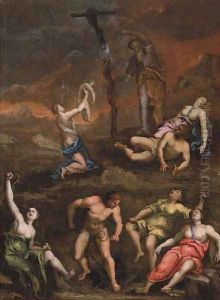Hans Speckhaert Paintings
Hans Speckhaert was a Flemish Renaissance painter whose work emerged in the 16th century. Born around 1540 in Brussels, which was then part of the Habsburg Netherlands, Speckhaert’s exact birthdate is unknown. Little is recorded about his early life or training, but it is believed that he was influenced by the Flemish artistic tradition that was prevalent during his time. This tradition was characterized by a high level of detail, vivid color, and complex iconography, all of which can be seen in Speckhaert's work.
Speckhaert's career unfolded during a period of significant religious, political, and cultural upheaval. The Protestant Reformation was spreading across Europe, leading to tensions between Protestant and Catholic communities, which often resulted in iconoclasm and a decline in religious art commissions. Despite these challenges, Speckhaert managed to find patronage and produced a body of work that includes religious subjects, mythological scenes, and possibly portraits.
Unfortunately, much of Speckhaert’s life and work is shrouded in mystery, and only a few of his works have been confidently attributed to him. His style is sometimes compared to that of Pieter Coecke van Aelst and may also show the influence of Italian Renaissance art, which had a significant impact on Northern European painters of the time. Speckhaert's use of perspective and his ability to render textures and materials were noted by his contemporaries and later art historians.
Hans Speckhaert died in 1577 in Brussels. His death marked the end of a relatively short career, and as a result, his influence on subsequent generations of artists was limited compared to other Flemish masters of the era. Despite this, he remains a figure of interest to art historians who study the Flemish Renaissance and the complex interplay of art, religion, and politics during the 16th century. His surviving works, while few, contribute valuable insight into the era's artistic practices and the stylistic tendencies in the Low Countries during a time of great transition.
